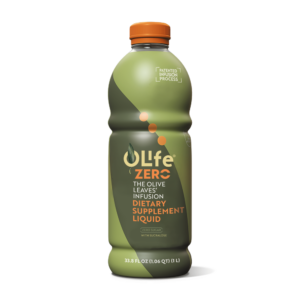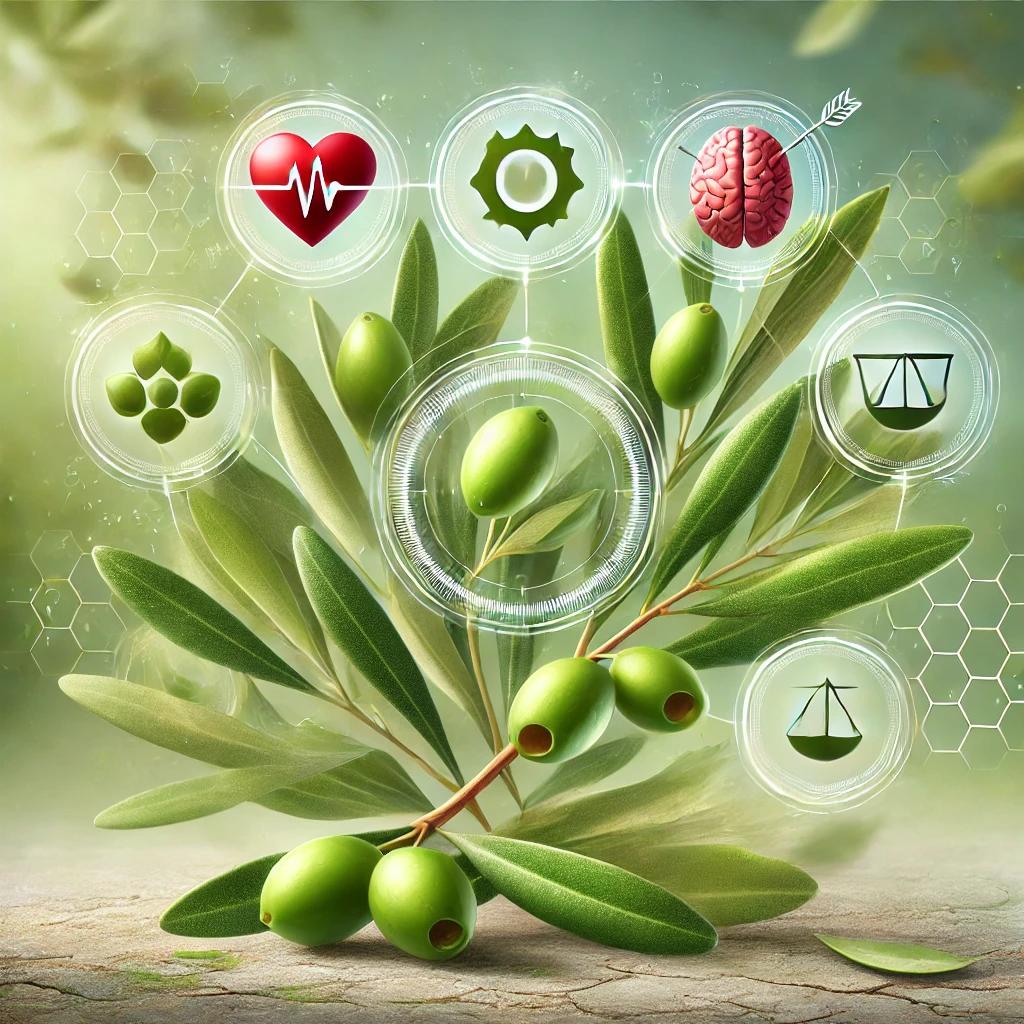Health Benefits of Olive Leaf Overview
Olive leaf extract has been used for centuries in traditional medicine, and it has garnered attention for its numerous health benefits. The active compound in olive leaf is oleuropein, a polyphenol that is responsible for many of its healing properties. Here’s a detailed overview of the health benefits of olive leaf:
1. Antioxidant Properties
- Protects Against Oxidative Stress: Olive leaf extract is rich in antioxidants, which help to neutralize free radicals in the body. Free radicals are unstable molecules that can cause oxidative stress, leading to cell damage and a variety of chronic diseases.
- Reduces Inflammation: The anti-inflammatory effects of olive leaf can help reduce inflammation in the body, lowering the risk of chronic conditions such as heart disease and arthritis.
2. Immune System Support
- Antiviral and Antibacterial Properties: Olive leaf has been shown to have natural antimicrobial effects. It can inhibit the growth of bacteria, fungi, and viruses, making it a potential natural remedy for fighting infections such as the flu, common cold, and even more serious viral infections.
- Enhances Immune Response: The polyphenols in olive leaf help to strengthen the immune system, making the body more resilient against pathogens. This is especially useful for those who are looking to improve their natural defense mechanisms.
3. Cardiovascular Health
- Blood Pressure Regulation: Studies have shown that olive leaf extract can help lower high blood pressure by dilating blood vessels and improving circulation. This reduces the strain on the cardiovascular system and helps maintain healthy heart function.
- Cholesterol Management: Olive leaf has been found to lower levels of LDL (bad cholesterol) and improve HDL (good cholesterol), promoting overall cardiovascular health.
- Prevents Atherosclerosis: The anti-inflammatory and antioxidant properties help prevent the oxidation of LDL cholesterol, which is a key factor in the development of atherosclerosis (hardening of the arteries).
4. Blood Sugar Regulation
- Improves Insulin Sensitivity: Olive leaf extract may help regulate blood sugar levels by improving insulin sensitivity. This makes it a potential complementary treatment for those managing type 2 diabetes or prediabetes.
- Lowers Blood Glucose: Several studies have demonstrated that olive leaf extract can lower blood glucose levels in individuals with high blood sugar, promoting overall metabolic health.
5. Weight Management
- Inhibits Fat Accumulation: Research suggests that olive leaf extract can help prevent the accumulation of excess fat by reducing the body’s ability to absorb dietary fats.
- Boosts Metabolism: The active compounds in olive leaf may enhance metabolic processes, leading to better energy utilization and fat burning, making it a useful addition to weight management efforts.
6. Anti-Cancer Properties
- Inhibits Cancer Cell Growth: Some studies indicate that olive leaf extract may help inhibit the proliferation of cancer cells, particularly in breast, prostate, and skin cancers. This is thought to be due to its antioxidant and anti-inflammatory properties.
- Promotes Apoptosis: Olive leaf compounds have been shown to induce apoptosis (programmed cell death) in cancer cells, which helps prevent the spread of tumors.
7. Skin Health
- Reduces Signs of Aging: The antioxidants in olive leaf extract protect skin cells from damage caused by free radicals and environmental factors, slowing the aging process and reducing the appearance of wrinkles and fine lines.
- Promotes Wound Healing: Olive leaf extract has antimicrobial properties that can accelerate the healing of wounds and skin infections, making it a valuable addition to skincare routines.
8. Anti-Inflammatory Benefits
- Joint Pain and Arthritis Relief: Due to its anti-inflammatory effects, olive leaf extract may help reduce pain and stiffness associated with inflammatory conditions like arthritis. It can inhibit the production of pro-inflammatory enzymes, offering relief for those with joint issues.
- Reduction of Muscle Soreness: Athletes and active individuals may benefit from olive leaf’s ability to reduce muscle soreness after exercise, speeding up recovery time.
9. Antimicrobial and Antifungal
- Fights Pathogens: Olive leaf has been shown to be effective against a variety of pathogens, including bacteria, viruses, and fungi. Its broad-spectrum antimicrobial effects make it an excellent natural remedy for infections.
- Candida Overgrowth: Olive leaf is particularly effective against Candida albicans, a fungus that can cause overgrowth and lead to health issues such as thrush, yeast infections, and digestive problems.
10. Brain Health
- Neuroprotective Effects: Olive leaf extract may help protect brain cells from oxidative damage and neuroinflammation, both of which are linked to cognitive decline and neurodegenerative diseases like Alzheimer’s and Parkinson’s.
- Improves Cognitive Function: Preliminary studies suggest that the polyphenols in olive leaf may enhance brain function and reduce the risk of age-related cognitive decline.
How to Use Olive Leaf Extract:
- Supplement Form: Olive leaf extract is commonly available in capsule or liquid form. It’s essential to follow recommended dosages, as overconsumption can lead to adverse effects.
- Tea: Olive leaf tea is another popular option and can be a soothing way to take advantage of its health benefits.
- Topical Applications: For skin health, olive leaf can be found in creams or oils that are applied directly to the skin.
Precautions:
- Interaction with Medications: Olive leaf extract may interact with certain medications, especially those for blood pressure or diabetes. It’s advisable to consult with a healthcare professional before starting supplementation.
- Allergies: Individuals allergic to olives or olive oil should be cautious when using olive leaf products, as they may experience allergic reactions.
Incorporating olive leaf extract into a health regimen offers a range of benefits, from boosting the immune system to promoting cardiovascular health. It’s a versatile natural remedy that can complement other health and wellness efforts.
 OLife®, the Infusion of Olive Leaves and Calendula Officinalis flowers is the exclusive food supplement of Evergreen Life. Thanks to a special, completely natural and patented production process (OLIVUM®), the maximum concentrations of the active ingredients present in olive leaves are extracted, in total respect of the plant, including: Oleuropein, Elenolic Acid, Rutin, Tyrosol and the powerful antioxidant Hydroxytyrosol. These molecules act synergistically with each other to improve the functioning of the body and promote our well-being thanks to a marked antioxidant action, an aid in the physiological control of blood sugar and cholesterol, a purifying, detoxifying and diuretic action. OLife® also promotes the metabolism of lipids and carbohydrates and, thanks to a protective action on blood vessels and vasodilator, promotes the regularity of blood pressure.
OLife®, the Infusion of Olive Leaves and Calendula Officinalis flowers is the exclusive food supplement of Evergreen Life. Thanks to a special, completely natural and patented production process (OLIVUM®), the maximum concentrations of the active ingredients present in olive leaves are extracted, in total respect of the plant, including: Oleuropein, Elenolic Acid, Rutin, Tyrosol and the powerful antioxidant Hydroxytyrosol. These molecules act synergistically with each other to improve the functioning of the body and promote our well-being thanks to a marked antioxidant action, an aid in the physiological control of blood sugar and cholesterol, a purifying, detoxifying and diuretic action. OLife® also promotes the metabolism of lipids and carbohydrates and, thanks to a protective action on blood vessels and vasodilator, promotes the regularity of blood pressure.
It has been scientifically recognized that these molecules have the following effects: antioxidant, antiradical, regulate arterial pressure, improve blood circulation, energizing, hypoglycaemic, lower cholesterol, metabolize lipids and carbohydrates.
Sources
Immune-Boosting Power: Antiviral effects: A study published in the Journal of Antiviral Research found that oleuropein inhibits the replication of certain viruses, including influenza and respiratory viruses.
Source: Omar, S. H. (2010). Oleuropein in Olive and its Pharmacological Effects. Scientia Pharmaceutica, 78(2), 133–154.
Antibacterial and Antifungal Properties:
A review in the International Journal of Antimicrobial Agents concluded that olive leaf extract possesses antimicrobial properties effective against various bacterial and fungal infections.
Source: Markin, D., Duek, L., & Berdicevsky, I. (2003). In vitro antimicrobial activity of olive leaves. Mycoses, 46(3-4), 132-136.
Cardiovascular Health:
Blood pressure regulation: Research published in the European Journal of Nutrition shows that olive leaf extract helps lower systolic and diastolic blood pressure in individuals with hypertension.
Source: Susalit, E., Agus, N., Effendi, I., Tjandrawinata, R. R., Nofiarny, D., Perrinjaquet-Moccetti, T., & Verbruggen, M. A. (2011). Olive (Olea europaea) leaf extract effective in patients with stage-1 hypertension: comparison with Captopril. Phytomedicine, 18(4), 251-258.
Cholesterol Management:
A study published in the Journal of Agricultural and Food Chemistry highlighted the cholesterol-lowering properties of olive leaf extract, showing a reduction in LDL levels.
Source: Andreadou, I., Iliodromitis, E. K., Mikros, E., Constantinou, M., Agalias, A., Magiatis, P., … & Kremastinos, D. T. (2006). The olive constituent oleuropein exhibits anti-ischemic, antioxidative, and hypolipidemic effects in anesthetized rabbits. Journal of Agricultural and Food Chemistry, 54(21), 8028-8035.
Oxidative Stress Reduction:
The antioxidant properties of olive leaf were demonstrated in a study that concluded oleuropein reduces oxidative damage and protects against free radicals.
Source: Visioli, F., & Galli, C. (2002). Oleuropein protects low-density lipoprotein from oxidation. Life Sciences, 64(12), 1223-1230.
Blood Sugar Regulation:
Research in the Journal of Nutritional Biochemistry shows that olive leaf extract improves insulin sensitivity and reduces blood glucose levels in diabetic patients.
Source: Wainstein, J., Stern, N., Heller, S., Boaz, M., & Madar, Z. (2012). Olive leaf extract as a hypoglycemic agent in both human diabetic subjects and in rats. Journal of Nutritional Biochemistry, 23(6), 639-644.
Weight Management:
A study on olive leaf’s role in fat metabolism found that the extract can help prevent fat accumulation and promote weight loss, published in the Journal of Medicinal Food.
Source: Somova, L. I., Shode, F. O., Ramnanan, P., & Nadar, A. (2003). Antihypertensive, antiatherosclerotic, and antioxidant activity of triterpenoids isolated from Olea europaea, subspecies africana leaves. Journal of Ethnopharmacology, 84(2-3), 299-305.
Please Note: The information on this website has not been evaluated by the Food & Drug Administration or any other medical body. We do not aim to diagnose, treat, cure or prevent any illness or disease. Information is shared for educational purposes only. You must consult your doctor before acting on any content on this website, especially if you are pregnant, nursing, taking medication, or have a medical condition. Thank you.
